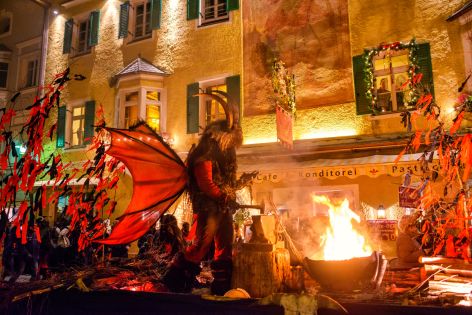Is Christmas a Pagan Holiday?
Is Christmas biblical? Is Christmas a pagan or a Christian holiday? Have you ever asked, “Should I celebrate Christmas as a Christian?” Here are the answers.
The ancient world was full of paganism. Pagan is a term describing belief and worship of multiple gods. Ancient pagans worshipped gods that were associated with nature, typically using statues and images.
Nearly every non-Israelite culture practiced a form of paganism. But the God of the Bible demanded something different. He claimed to be the one Almighty God and strictly commanded people not to worship Him with images or statues.
Though paganism and polytheism aren’t as common today in the Western world, many of their elements still remain with us in various traditions, some of which are associated with Christianity.
One of those traditions is the Christmas holiday—which has deep roots in paganism. Many wonder, is Christmas a purely pagan festival?
Let’s consider some of the pagan elements incorporated in this popular holiday.
The pagan history of Christmas
Here are three ways Christmas is connected to paganism:
1. The pagan timing of Christmas.
The biblical celebrations ordained by God are celebrated in three seasons of the year: spring, summer and fall in the northern hemisphere (Exodus 23:14-16; Leviticus 23). None of the commanded festivals of the Bible were celebrated in the winter. (The Feast of Dedication mentioned in John 10:22 was not a commanded festival, but was a national celebration of the Jewish people.)
The ancient people of Europe, especially in northern parts, hated winter not just because it was cold, but also because of the dark days with only a few hours of sunlight. Many pagan civilizations celebrated the winter solstice because it marked the time when the days would begin getting longer. They saw this as a day when the sun (worshipped as a god) began conquering the darkness of winter.
In A.D. 274 the Roman Emperor Aurelian elevated the sun god as the chief Roman god by dedicating a new temple to him on Dec. 25.
Some of the pagan festivals surrounding the winter solstice were Yule (the Nordics), Koliada (eastern Europe) and Saturnalia (Rome).
In A.D. 274 the Roman Emperor Aurelian elevated the sun god as the chief Roman god by dedicating a new temple to him on Dec. 25. (Sol Invictus was the Roman version of the Persian sun god, Mithra.)
It is a widely known fact that in the fourth century the Catholic Church adopted the pagan celebration of the winter solstice and modified it. They decided to use it to worship the birth of the Son of God, instead of the sun god. “The winter solstice or Brumalia, by now the feast of Mithras and the Unconquered Sun, had been associated with the birth of Jesus in 354 by Bishop Liberius of Rome” (Prudence Jones and Nigel Pennick, A History of Pagan Europe, 1995, p. 76).
2. The pagan nature worship associated with Christmas customs.
During the cold and dark winter months, the fir tree remains green. Pagans, in their worship of nature, revered evergreen trees as sacred because the cold and darkness could not prevail against them.
The pagans would cut the trees and bring them into their houses as a good omen and symbol of fertility. In addition, they would decorate their houses with greenery and flowering plants, such as holly, ivy and mistletoe.
These traditions continue today with the practice of decorating the iconic symbol of Christmas, the Christmas tree, and their homes with tinsel, garlands and wreaths. "The name of Saturnalia died out, but its celebrations, such as decking houses with evergreens, giving presents and feasting, were attached to Christmas” (ibid.).
3. The pagan origins of the Santa Claus myth.
Santa Claus, too, has become an iconic symbol of Christmas. But the modern-day Santa is far tamer than his ancient counterpart.
A scene from the “Nikolaus and Krampusumzug” (St. Nicolas and Krampus Night), which takes place annually on Dec. 5 in Sterzing, South Tyrol, Italy (iStock.com/sack). 
Some of these traditions are still practiced today in their raw form in Germany, Austria, Hungary and the Czech Republic.
When these traditions were appropriated into Christmas, Krampus was associated with Saint Nicholas. For a while, the two worked together as “good cop, bad cop,” with Krampus punishing the naughty children and Santa rewarding the good. But eventually the two were combined and merged into the modern-day Santa Claus.
These are just three examples of pagan traditions that were blended into the Christmas holiday. It is not hard to Google this topic or explore it in an encyclopedia to learn more.
Yet despite the pagan roots of Christmas being so obvious and easy to study, millions of people around the world still celebrate it as a “Christian” holiday.
Why Christmas is a lie
When Jesus and the Samaritan woman struck up a conversation at the well, she asked Him about the differences between her Samaritan beliefs and the Jews’ beliefs. The Samaritans worshipped God on Mount Gerizim (they still do), while the Jews believed that worship must be centered on Jerusalem (John 4:20).
Jesus then told her that what God is most concerned about is how He is worshipped. Jesus said God demands to be worshipped “in spirit and truth” (John 4:23-24).
Christians should base their worship of God and Jesus Christ on what the Bible reveals—not the pagan traditions of ancient cultures.
This is the key. Worship is not considered legitimate to God just because it’s done with sincerity and passion—it also must be based on truth. Christians should base their worship of God and Jesus Christ on what the Bible reveals—not the pagan traditions of ancient cultures.
Jesus taught that God’s words are truth, and we should live by every word of God (John 17:17; Matthew 4:4). Years after Jesus’ resurrection, the apostle John wrote that no lies should be mixed with the truth that comes from God (1 John 2:21).
But Christmas is literally riddled with lies. Consider the following:
- Nowhere in the Bible is the date of Jesus’ birth identified—though it does contain clues that His birth was almost certainly not in the wintertime.
- Nativity scenes often depict three wise men bearing gifts, yet a close reading of the biblical description shows that no wise men were present on the night of Jesus’ birth.
- Many Christians lie to their children about the existence of Santa, a direct violation of God’s commandment to not lie (Exodus 20:16).
To learn more about lies associated with Christmas, read our article “The Birth of Jesus: Myths and Misperceptions.”
The danger of mixing in paganism
Christmas and its traditions are not the only example of paganism being mixed with worship of the true God. The Old Testament records that religious syncretism (the blending of different religious traditions together) was a constant problem ancient Israel had throughout its history.
The prophet Elijah had to confront Israel about integrating Baal worship (a Canaanite god) with the worship of the true God. Here is how Elijah addressed this: “How long will you falter between two opinions? If the LORD is God, follow Him; but if Baal, follow him” (1 Kings 18:21).
In other words, don’t blend the worship of Baal with worship of the true God. Worship one or the other—but not both!
Yet the people didn’t know how to answer. Why? Because after years of false practices passed from generation to generation, the people themselves did not know what was true anymore.
To learn more about the dangers of syncretism, read “What Is Religious Syncretism? Does God Accept It?”
Why you should abandon Christmas
Today it is no different. In order to learn what truth is and practice pure worship, we have to abandon Christmas and its lies. History shows that Christmas is a purely pagan festival.
God’s Word does give us instruction on how to worship Him. Though most people ignore them, He ordained seven festivals that help us understand what is true according to God. Thousands of Christians around the world don’t celebrate Christmas because they have learned that it is a pagan holiday. They take the Bible seriously and strive to worship God “in spirit and truth.”
You can’t do that with Christmas—because it is a pagan holiday and always will be.
Date Posted: December 12, 2024



